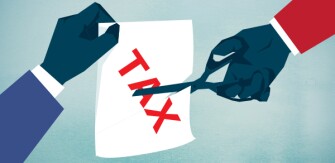
A tax rule proposed by the Trump Administration as part of a crackdown on blue states trying to circumvent parts of the new GOP tax law could hurt school vouchers popular in many red states.
Tax-credit scholarships are voucher-like programs funded through tax breaks and private donations that have grown in popularity as a workaround to state constitutions that strictly prohibit public dollars flowing directly into private, religious schools, as they do in traditional voucher programs.
Private school choice advocates are up in arms that tax-credit scholarships are getting swept into another standoff between the Trump Administration and Democratic-led states.

Under the Tax Cuts and Jobs Act passed in 2017, wealthy residents in states such as New York and California face sizable increases in their federal tax bills because of a $10,000 cap on state and local tax deductions they can make on their federal returns. Democratic lawmakers allege the so-called SALT-cap unfairly targets left-leaning states.
In response, a few states came up with ways to circumvent the cap, modeled off of tax-credit scholarship programs, said Carl Davis, the research director at the Institute on Taxation and Economic Policy. State and local governments in New York, New Jersey, and Connecticut created charities where people could donate money to help fund public services such as education or healthcare and receive generous tax-credits in return. Donors could then turn around and claim 100 percent of the money they gave to those government-run charities as a charitable donation on their federal income tax return.
Other states were considering similar programs to help their high-earning residents.
EdWeek Explains: What Are School Vouchers and How Do They Work?
But now the Treasury Department and the IRS have put the kibosh on the scheme with a new rule that says that people can no longer receive the federal charitable deduction on donations that they have also received a state tax-credit for—basically, no more double dipping.
And that includes tax-credit scholarship programs enacted well before the 2017 tax overhaul which use tax credits to incentivize donations to groups that provide scholarships to students to attend private schools.
“These taxpayers want to look like philanthropists when they’re not,” said Davis. “The IRS is saying, we don’t care who you are donating to, if you get your money back, you get your money back, and you can’t count it as a charitable donation.”
Many tax-credit scholarship programs are so generous—sometimes offering a dollar-for-dollar tax-credit—that donors could actually make money off of their donation, if they claimed the federal deduction on top of the tax credit.
Davis said this is the case in 12 of the 18 states that have created tax-credit scholarships. Some states such as Florida and Illinois already prevent donors from claiming both state tax credits and federal charitable deductions on the same donations, he said.
Tax-credit scholarship programs that relied on offering big benefits to reel in donors interested in the tax breaks more than school choice stand to lose the most, said Leslie Hiner, the vice president of legal affairs at EdChoice, an advocacy, lobbying, and research organization.
School choice advocates were already worried that uncertainty over the new tax law was going to lead to a decline in donations to tax-credit scholarship programs—a concern that’s now compounded by the fact that the new IRS rule means there’s markedly less benefit to participating in many state programs.
“At this point, we’re dealing with a lot of unknowns,” said Hiner. “It’s not fair to taxpayers and it’s certainly not fair to these kids who are relying on these scholarships.”
EdChoice estimates the new rule could impact 250,000 mostly low-income students.
Voucher proponents have criticized the Treasury Department and the IRS, saying that the proposed rule could have been tailored to only target the new government-run charities that have popped up in response to the tax law.
While technically, yes, that would have been possible, it would have been a very political move, said Steven Rosenthal, a senior fellow at the Urban-Brookings Tax Policy Center.
“But just because you can draft a rule to hit one group but not another, doesn’t mean that it’s the correct rule from a policy standpoint,” said Rosenthal. “I don’t think it would be hard to give the red states, the school choice people, what they wanted ... but as a policy matter I think it would be completely inconsistent and foolish.”
This scuffle over the SALT-cap and school choice may not be over. There may be lawsuits and the Treasury Department and the IRS could reverse course, said Rosenthal.
“These are only proposed regulations,” he said.
Related stories:
- Is ‘Voucher’ a Bad Word? What the Public Thinks About School Choice
- How the Janus Decision Could Fuel the Growth of Charter Schools and Vouchers
- Getting a Private School Voucher in D.C. Lowers Students’ Math Scores, Study Finds
